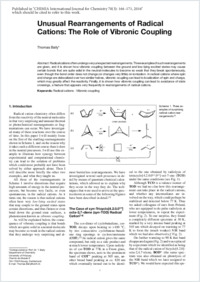Unusual Rearrangements of Radical Cations: The Role of Vibronic Coupling
- Bally, Thomas Department of Chemistry, University of Fribourg, Switzerland
-
30.03.2016
Published in:
- CHIMIA International Journal for Chemistry. - 2016, vol. 70, no. 3, p. 164–171
English
Radicalcations often undergo very unexpected rearrangements. Three examples of such rearrangements are given, and it is shown how vibronic coupling between the ground and low-lying excited states may cause certain bonds that are quite solid in the neutral molecules to become so weak that they break spontaneously, even though the bond order does not change (or changes very little) on ionization. In radical cations where spin and charge are delocalized over two similar halves, vibronic coupling can lead to localization of spin and charge, which may greatly affect the reactivity. Finally, it is shown how vibronic coupling can lead to avoidance of state crossings, a feature that appears very frequently in rearrangements of radical cations.
- Faculty
- Faculté des sciences et de médecine
- Department
- Département de Chimie
- Language
-
- English
- Classification
- Chemistry
- License
- License undefined
- Identifiers
-
- RERO DOC 277624
- DOI 10.2533/chimia.2016.164
- Persistent URL
- https://folia.unifr.ch/unifr/documents/305344
Statistics
Document views: 44
File downloads:
- bal_urr.pdf: 106
